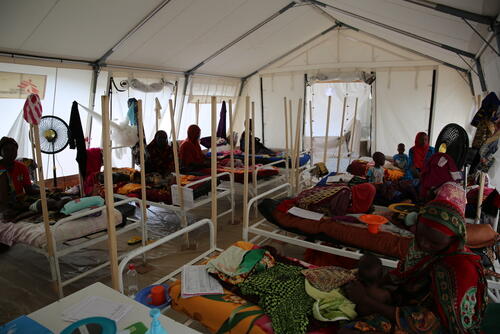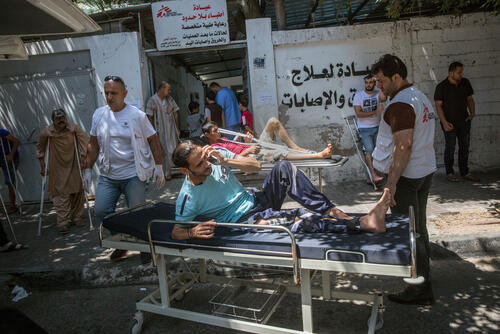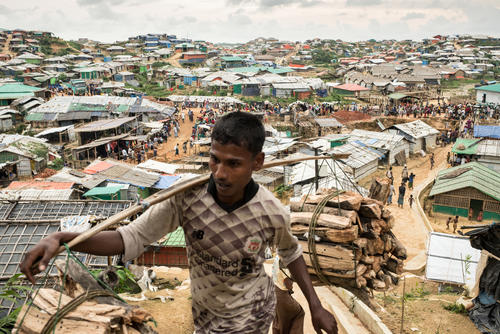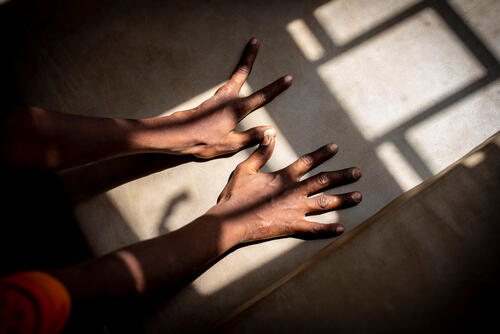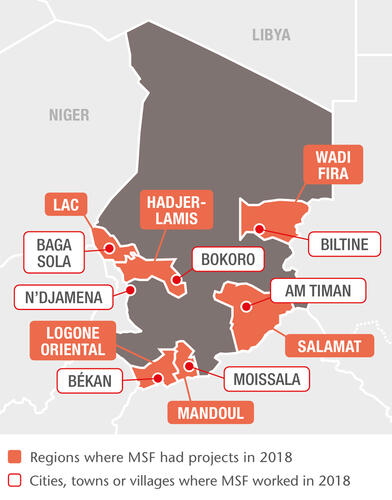
142,400
142,4
82,100
82,1
9,800
9,8

1,860
1,86
Malnutrition is endemic in the Sahel strip, which runs across the middle of Chad, and in 2018 it was exacerbated by a number of factors, including particularly severe seasonal food insecurity, a general lack of purchasing power, and a deepening economic crisis. Access to care was further reduced by a public health workers’ strike.
Médecins Sans Frontières (MSF) launched an emergency response in the capital, N’Djamena. In July, in partnership with the Ministry of Health, we opened an inpatient feeding centre, where our teams treated over 1,000 children aged under five for severe acute malnutrition and associated medical complications. We set up an additional six outpatient feeding centres in health centres around the city.
We also treated severely malnourished children in Wadi Fira, a rural region in eastern Chad, where the ‘lean season’ – when food stocks are depleted and the risk of malnutrition mounts – was particularly harsh in 2018.
Responding to other emergencies
In May, in response to an outbreak of measles around Bokoro, in Hadjer Lamis, we supported the health authorities to set up disease surveillance and provide medical care to children.
We also sent an emergency team to Logone Oriental, where 29,000 people sought refuge from attacks in the Central African Republic. Hospital access was hampered during the rainy season, which brings a seasonal peak in malaria and malnutrition, so our teams focused on running mobile clinics and supporting health centres near the border, in Békan and Bégoné.
We provided paediatric care for both refugees and local communities, and set up a stabilisation unit and referral system for children in need of secondary care. The team conducted over 16,500 consultations, admitted 430 children to the stabilisation unit and referred 300 to the hospital in Goré. They also ensured a supply of safe drinking water.
Fighting malaria in Moissala
Since 2010, our work in Moissala, southern Chad, has focused on the prevention and treatment of malaria in young children and pregnant women. In 2018, we treated over 5,600 patients in Moissala hospital, 57 per cent of whom presented with malaria.
We also treated 45,000 patients across 23 health centres, while initiating an assessment of the broader health needs among women and children in the area, with a view to expanding activities. Preventive treatment campaigns (seasonal malaria chemoprevention) reached over 120,000 children.
Project handovers in Lac and Salamat regions
The humanitarian emergency caused by the mass displacement of civilians in Lac region in 2015 has subsided, with people starting to return home. This, combined with the presence of other organisations on the ground, enabled us to complete the handover of our activities to the local health authorities in 2018.
We also completed the handover of our activities in Am Timan, Salamat region, where we had been running nutrition programmes, supporting the regional hospital’s maternal and paediatric services, and providing treatment for malaria, HIV and tuberculosis since 2010.
In these eight years, our teams treated more than 40,000 children for acute malnutrition, admitted 20,500 patients to hospital and assisted 17,500 births.



